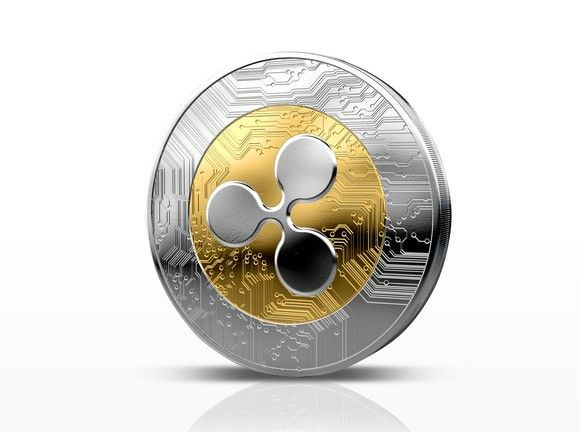From Ripple To IOTA, 4 Cryptocurrencies That Plummeted In January 2018

This article originally appeared in the Motley Fool.
Since the beginning of 2017, no asset class has been more impressive than cryptocurrencies. Last year, the market cap of all digital currencies added together surged from less than $18 billion to $613 billion, representing a gain of over 3,300%. It would otherwise have taken decades for the stock market to deliver what virtual coins generated in the span of 12 months.
There have certainly been no shortage of catalysts pushing cryptocurrency valuations higher. For example, the rise of blockchain technology, which was thrust into the spotlight thanks to bitcoin, has been instrumental in vaulting virtual currencies to new heights. Blockchain is the digital, distributed, and decentralized ledger that underlies cryptocurrencies and is responsible for logging all transactions. It's believed that blockchain could shorten transaction settlement times, lower transaction fees, and improve network security.
In addition to blockchain, cryptocurrencies have thrived off retail investors' emotions, a weaker U.S. dollar, and an ample supply of news-driven events.

These Cryptocurrencies Were Crushed In January
However, this parabolic move in digital currencies has also led to an exceptional amount of volatility. After soaring to the heavens in December, crypto valuations came back to Earth in January, with many large virtual currencies (those with a $1 billion market cap, or higher) falling by a double-digit percentage. While this list is by no means comprehensive, here are four cryptocurrencies that were absolutely throttled last month.
Bitcoin: Down 29%
There's virtually no way we can discuss the worst-performing digital currencies in January without paying homage to bitcoin, the world's largest cryptocurrency by market cap. As goes bitcoin, so goes the virtual coin market; and last month, bitcoin shed 29% of its value, which was nearly $65 billion in total market cap.
Why such a miserable month? Aside from some likely profit-taking following bitcoin's meteoric rise, speculation surrounding stepped-up regulation has weighed on the most popular cryptocurrency. For instance, South Korea is in the process of implementing new anonymity rulesthat require identity disclosure when linking verified bank accounts to cryptocurrency exchanges. Beginning Jan. 30, only individuals with verified accounts will be able to add funds. Considering the South Korean won was the second-most-used currency behind the U.S. dollar in global bitcoin trading last year, any major changes in trading rules regarding bitcoin are bound to shake the market.
As icing on the cake, social-media giant Facebook (NASDAQ:FB) announced at the tail end of the month that it was ceasing all cryptocurrency and initial coin offering (ICO) advertisements. In a statement, Facebook suggested that cryptocurrencies and ICOs are "frequently associated with misleading or deceptive promotional practices." That's a perfect summary of bitcoin's topsy-turvy January.

Ripple: Down 51%
Among the very largest cryptocurrencies, arguably none had a worse month than Ripple, which lost more than half of its value. Then again, Ripple gained over 35,500% in 2017, so it's not exactly as if investors are crying the blues.
Ripple's big surge came on the heels of two major partnership announcements over a span of two months. Ripple announced that American Express (NYSE:AXP) and Banco Santander (NYSE:SAN) were teaming up to test its blockchain in cross-border non-card payments American Express users made to Banco Santander's U.K. accounts. Ripple suggests these transactions could settle instantly, rather than waiting days to clear.
The second deal involves MoneyGram International (NASDAQ:MGI) . MoneyGram will be testing Ripple's XRP coin in an effort to expedite money transfer settlements and lower transaction costs. Quicker transfer and lower costs could give it a leg up on its rivals.
However, investors may have realized that Ripple still has a lot to prove. These partnerships represent mere tests or small-scale projects, and that simply didn't justify what had been a roughly $100 billion valuation. Also, the barrier to entry among cryptocurrencies is very low, meaning Ripple's blockchain may not remain the perceived favorite among banks for long.

IOTA: Down 36%
The IOTA Foundation made a name for itself toward the end of 2017 when it announced that it would be beta testing its Data Marketplace, a blockchain-based, transaction-fee-free service that would allow companies to sell their unused data that would otherwise go to waste. The project itself has no official partners, but there are around 40 participants that have agreed to assist IOTA with feedback during the beta process. The simple fact that many of these participants are brand-name or household companies created quite the stir with investors.
Unfortunately, January wasn't too kind to IOTA or its investors, with the cryptocurrency tumbling 36%. The biggest issue of late has been that the scaling of IOTA's blockchain has caused its transaction processing times to drag (and I do mean drag). Though not exactly a firm news source, users on various cryptocurrency forums have expressed frustration about significant lag times in processing IOTA transactions, some of which were delayed hours or days. Remember, blockchain is designed to eliminate the lag time associated with the current banking system, so this would suggest that IOTA still has a lot of work to do.
It should also be noted that IOTA's Data Marketplace, while a really intriguing idea, is nothing more than a beta test at the moment. Investors may have come to terms with the fact that IOTA is probably a ways away from launching its unique blockchain product.
Verge: Down 69%
But if there were a disaster du jour, it belonged to privacy coin Verge, which almost lost 70% of its value in a month. Yet it's important to keep things in context. Last year, Verge rose by more than 1,100,000% (that's 1.1 million percent), so investors in its XVG coin have done just fine if they've been holding for more than, say, eight weeks.
Interest in Verge derives from the privacy-coin movement, which has grown in popularity. Privacy coins take the perceived anonymity of cryptocurrency transactions and turns it up a whole bunch. You see, despite not having to enter your Social Security number or other vital information when undertaking a digital currency transaction, blockchain analysis can still often lead back to a sender or receiver of funds. This makes traditional cryptos like bitcoin not nearly as anonymous as most folks believe. Digital currencies like Verge use extra protocols to obfuscate the sender and receiver of funds.
The recent downside in Verge looks to be a combination of two factors. First, I don't think we can overlook profit-taking after its astronomical rise. Second, South Korea's push for cryptocurrency trader transparency, as already described, is a potentially major blow for privacy coins like Verge, Dash, and Monero. These coins rely on the desire of libertarians to want to remain anonymous. But if global governments are going to step in and disallow this type of anonymity for fear of fraud, it could undermine Verge and its peers.
Sean Williams has no position in any of the stocks or cryptocurrencies mentioned. The Motley Fool owns shares of and recommends Facebook, but has no position in any cryptocurrencies mentioned.. The Motley Fool has the following options: long March 2018 $200 calls on Facebook and long March 2018 $170 puts on Facebook. The Motley Fool recommends American Express. The Motley Fool has a disclosure policy.




















